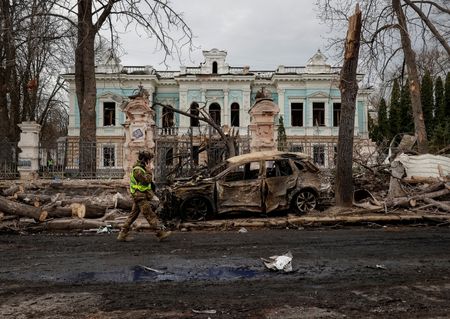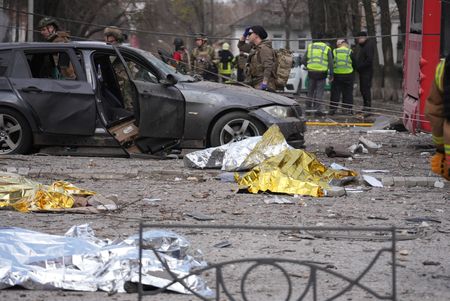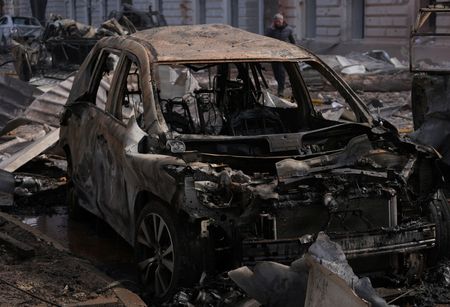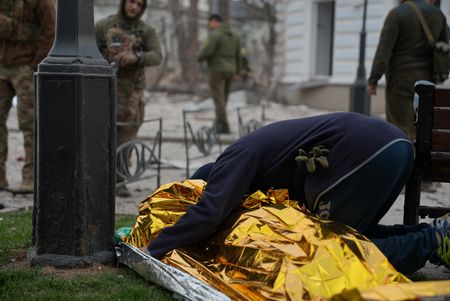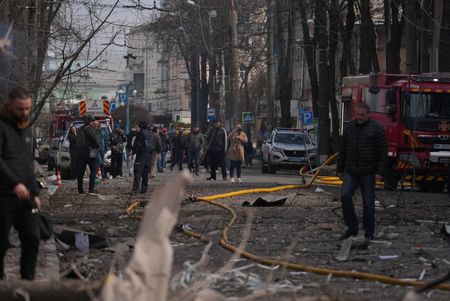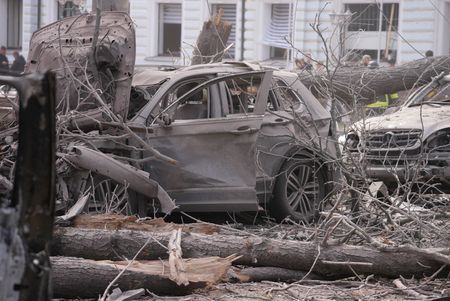By Vitalii Hnidyi and Max Hunder
SUMY, Ukraine/KYIV (Reuters) -Two Russian ballistic missiles slammed into the heart of the northern Ukrainian city of Sumy on Sunday, killing 34 people and wounding 117 in the deadliest strike on Ukraine this year, officials said.
President Volodymyr Zelenskiy demanded a tough international response against Moscow over the attack, which came with U.S. President Donald Trump’s push to rapidly end the war struggling to make a breakthrough.
Dead bodies were strewn on the ground in the middle of a city street near a destroyed bus and burnt-out cars in a video posted by Zelenskiy on social media.
“Only scoundrels can act like this. Taking the lives of ordinary people,” he said, noting that the attack had come on Palm Sunday when some people were going to church.
“You know, the people who are fighting against us always say that they are Orthodox (Christian) believers, that they believe in God, but we have experienced first-hand terrorism today. I have no words,” said 27-year old PhD student Yevhen, a local resident who declined to give his surname.
The leaders of Britain, Germany and Italy condemned the attack.
“These attacks show just what Russia’s supposed readiness for peace is worth,” German Chancellor Olaf Scholz wrote on social media.
Russian authorities did not immediately respond to a Reuters request for comment. Russia denies targeting civilians but thousands have been killed and injured in its invasion of Ukraine.
It followed a missile strike in the central Ukrainian city of Kryvyi Rih, Zelenskiy’s hometown and far from the ground war’s front lines in the east and south, earlier this month that killed 20 people, including nine children.
Sumy, with a population of around a quarter of a million and located just over 25 km (15 miles) from the Russian border, became a garrison city when Kyiv’s forces launched an incursion into Russia last August that has since been largely repelled.
Sumy’s acting mayor, Artem Kobzar, announced three days of mourning for the victims starting from Monday.
The people who were caught in Sunday’s strike were out on the street or inside cars, public transport and buildings when the missiles hit, Interior Minister Ihor Klymenko said.
“Deliberate destruction of civilians on an important church feast day,” he wrote.
Andriy Yermak, Zelenskiy’s chief of staff, said the missiles contained cluster munitions. “The Russians are doing this to kill as many civilians as possible,” he said.
Maryana Bezuhla, an outspoken Ukrainian lawmaker known for her sharp public criticism of military commanders, suggested on the Telegram app that the attack had taken place due to information about a gathering of soldiers leaking out.
Reuters was not able to verify that information, and Bezuhla did not post evidence.
Local resident Pavriz Manakhov told Reuters that he had not seen soldiers in the area.
“We live in the city centre, there is no military base, there are no soldiers here.”
Russia launched a full-scale invasion of Ukraine in February 2022 and currently holds nearly 20% of the neighbouring country’s territory in the east and south. Russian forces have been slowly advancing in the east.
‘SO-CALLED DIPLOMACY’
Foreign Minister Andrii Sybiha said Kyiv was “sharing detailed information about this war crime with all of our partners and international institutions”.
The International Criminal Court in The Hague, which Ukraine officially joined this year, is conducting investigations into high-profile cases of alleged war crimes in the conflict.
Andriy Kovalenko, a security official who runs Ukraine’s Centre for Countering Disinformation, noted that the strike came after a visit to Russia by U.S. envoy Steve Witkoff for talks with top officials including President Vladimir Putin.
“Russia is building all this so-called diplomacy … around strikes on civilians,” he wrote on Telegram.
Under Trump’s administration, U.S. officials have held separate rounds of talks with Kremlin and Kyiv officials to try to move towards a cessation of hostilities in Ukraine.
Ukraine and Russia agreed to pause strikes on each other’s energy facilities last month, but both sides have repeatedly accused each other of breaking the moratorium.
Witkoff, Trump’s special envoy, held talks with Putin on Friday in St. Petersburg on the search for a Ukraine peace deal. Trump told Russia to “get moving”.
In the aftermath of Sunday’s Sumy strike, Zelenskiy called on the United States and Europe to respond robustly to what he described as Russian terrorism.
“Russia wants exactly this kind of terror and is dragging out this war. Without pressure on the aggressor, peace is impossible. Talks have never stopped ballistic missiles and aerial bombs,” he wrote.
Russia’s defence ministry accused Ukraine on Saturday of having carried out five attacks on Russian energy infrastructure over the previous day in what it called a violation of the U.S.-brokered moratorium on such strikes.
(Writing by Max Hunder; editing by David Goodman, Giles Elgood, Tom Balmforth, Mark Heinrich and David Evans)


